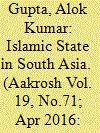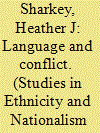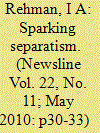| Srl | Item |
| 1 |
ID:
145664


|
|
|
|
|
| Summary/Abstract |
Drawing on data from 30 in-depth interviews with prominent Australian Muslim leaders, this paper argues that the concept of identity could bring together and explain the sources and dynamics of struggles over the Muslim leadership in Australia. The paper will demonstrate that identity definition lies at the centre of competitions and contestations around the Australian Muslim leadership. From within, sub-groups such as Muslim youth and Muslim women contest the incumbent leadership, striving to impose a new image and definition of the Muslim identity in the Australian public sphere. From without, stakeholders such as the Australian government and the Australian media influence the dynamics of the Muslim community leadership by supporting a group of Muslim leaders over others—a process aiming to define who Muslims are in the Australian context.
|
|
|
|
|
|
|
|
|
|
|
|
|
|
|
|
| 2 |
ID:
146757


|
|
|
| 3 |
ID:
118349


|
|
|
|
|
| Publication |
2012.
|
| Summary/Abstract |
Upon decolonisation, nationalist leaders in two North African countries, Algeria and Sudan, promoted a policy called Arabisation (ta'rib), which sought to impose standard literary Arabic at the expense of English (in Sudan), French (in Algeria), and other local languages (in both places). This language policy reflected the worldview of Muslim leaders, who hoped to break from the colonial past and start afresh while forging alliances with Arab Islamic states. Arabisation succeeded in expanding the use of literary Arabic in Sudanese and Algerian government bureaus as well as in schools and universities. However, in some circles it helped to stimulate oppositional identities that rejected pan-Arabism as a focal point for national pride and that challenged the cultural foundations of national cohesion. Taking a comparative approach, this study argues that Arabic language policy in Algeria and Sudan featured strongly in postcolonial nationalism and civil conflict. It concludes by considering the status of language cultures and policies today in Algeria, the Republic of the Sudan, and the newly independent Republic of South Sudan, and contends that state-led efforts at 'language rationalisation' have not eliminated multilingualism in practice.
|
|
|
|
|
|
|
|
|
|
|
|
|
|
|
|
| 4 |
ID:
095393


|
|
|